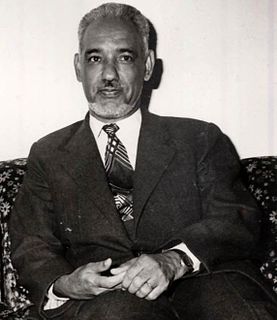The original inhabitants of Mauritania were the Bafour, presumably a Mande ethnic group, connected to the contemporary Arabized minor social group of Imraguen ("fishermen") on the Atlantic coast.

The first fully democratic Presidential election since 1960 occurred on 11 March 2007. The election was the final transfer from military to civilian rule following the military coup in 2005. This was the first time the president was selected by ballot in the country's history. The election was won by Sidi Ould Cheikh Abdallahi, who was ousted by a military coup in 2008 and replaced by general Mohamed Ould Abdel Aziz.

Lt. Col. Mohamed Mahmoud Ould Louly was the President of Mauritania and Chairman of the Military Committee for National Salvation (CSMN) from 3 June 1979 to 4 January 1980.
Mauritanian People's Party was the sole legal party of Mauritania from 1961 to 1978. It was headed by President Moktar Ould Daddah.

A Mauritanian presidential election occurred on 11 March 2007. Since no candidate received a majority of the votes, a second round was held on 25 March between the top two candidates, Sidi Ould Cheikh Abdallahi and Ahmed Ould Daddah. Abdallahi won the second round with about 53% of the vote and took office in April.
Ahmed Ould Daddah is a Mauritanian economist, politician and civil servant. He is a half-brother of Moktar Ould Daddah, the first President of Mauritania, and belongs to the Marabout Ouled Birri tribe. He is currently the President of the Rally of Democratic Forces (RFD) and was designated as the official leader of the opposition following the 2007 presidential election, in which he placed second.
This article is about the history of Mauritania from 1960 to 1978. Mauritania, officially the Islamic Republic of Mauritania, is an Arab Maghreb country in West Africa. It is bordered by the Atlantic Ocean in the west, by Western Sahara in the north, by Algeria in the northeast, by Mali in the east and southeast, and by Senegal in the southwest. It is named after the ancient Berber Kingdom of Mauretania, which later became a province of the Roman Empire, even though the modern Mauritania covers a territory far to the south of the old Berber kingdom that had no relation with it.
Ahmed Baba Miské was a Mauritanian politician, writer, diplomat and author of Lettre ouverte aux elites du Tiers-monde. He was a Mauritanian ambassador and Polisario Front member.

Presidential elections were held for the first time in Mauritania in August 1961 to elect the President for the next five years. Moktar Ould Daddah, who had been acting head of state since independence from France in 1960 was the only candidate, and was elected unopposed. Although he was a member of the ruling Mauritanian Regroupment Party, his candidacy was also supported by the Mauritanian National Union. Voter turnout was 93.6%.

Presidential elections were held in Mauritania on 7 August 1966. Following the merger of all the country's political parties into the Mauritanian People's Party (PPM), the country had become a one-party state in December 1961. Its leader, incumbent President Moktar Ould Daddah, was the only candidate, and was re-elected unopposed. Voter turnout was 96.2%.

General elections were held in Mauritania on 8 August 1971 to elect a President and National Assembly, the first time the two elections had been held together. At the time, the country was a one-party state with the Mauritanian People's Party (PPM) as the sole legal party. Its leader, incumbent President Moktar Ould Daddah, was the only candidate in the presidential election, and was re-elected unopposed to a third term in office, whilst the PPM won all 50 seats in the National Assembly election. Voter turnout for the parliamentary election was reported to be 95.6%.

General elections were held in Mauritania on 8 August 1976 to elect a President and National Assembly. At the time, the country was a one-party state with the Mauritanian People's Party (PPM) as the sole legal party. Its leader, incumbent President Moktar Ould Daddah, was the only candidate in the presidential election, and was re-elected unopposed, whilst the PPM won all the seats in the National Assembly election. Voter turnout was 97.9%. They were the last elections held until the restoration of multi-party democracy in 1992.
Mauritanian National Renaissance Party was an Arab nationalist political party in Mauritania from 1958 to 1961. It was led by Ahmed Baba Miské.
The Mauritanian National Union was a political party in Mauritania. The party was founded in April 1959, as a merger between a dissident group in the Mauritanian Regroupment Party (PRM) and the Union of Natives of Southern Mauritania (UOMS). The foundation of the party took place in the run-up to the May 1959 legislative elections. Members of the party bureau of UNM included Hadrami Ould Khatrri, Moussa Sall, Yacoub Ould Boumediana (chairman) and Ba Abdoul Aziz. The UNM favoured unity with the neighbouring states in the Mali Federation.
The following lists events that happened during 1960 in Mauritania.
Aïssata Touré Kane is a former Mauritanian politician who was the country's first female government minister. After holding leadership positions in the youth wing and women's section of the Mauritanian People's Party, she served in the cabinet of President Moktar Ould Daddah from 1975 to 1978. Her time as a minister ended when Daddah's government was overthrown by a military coup.





